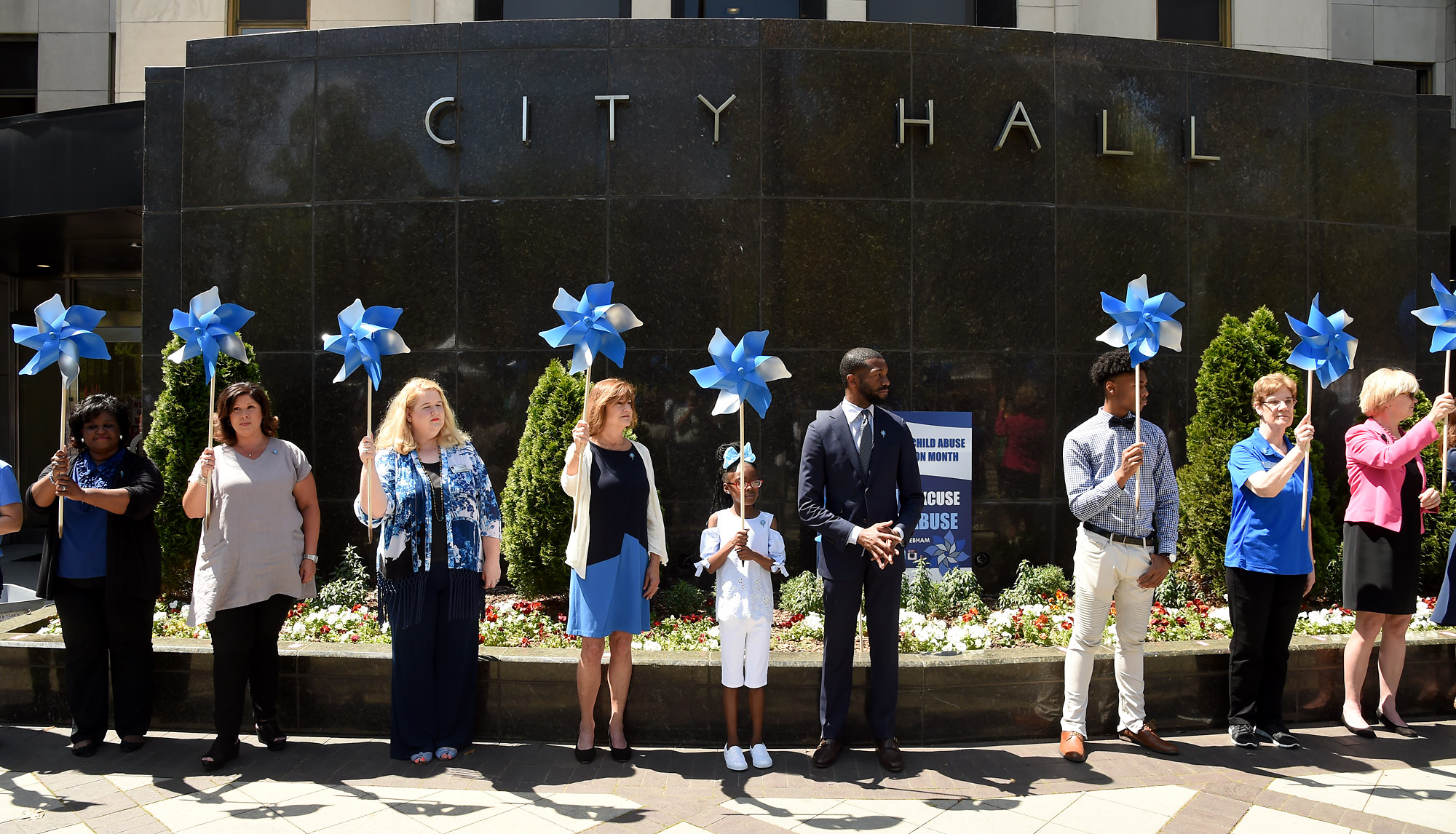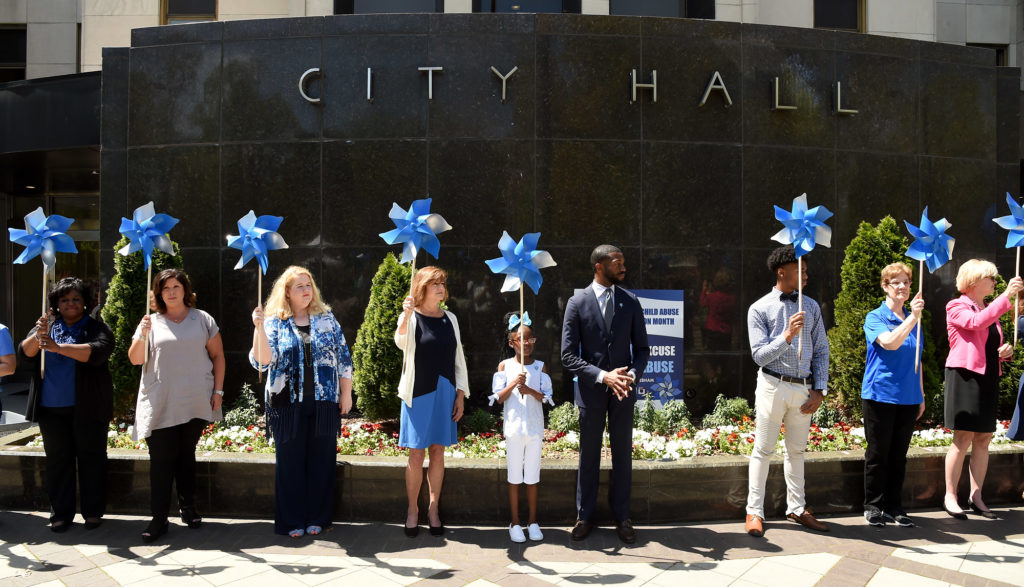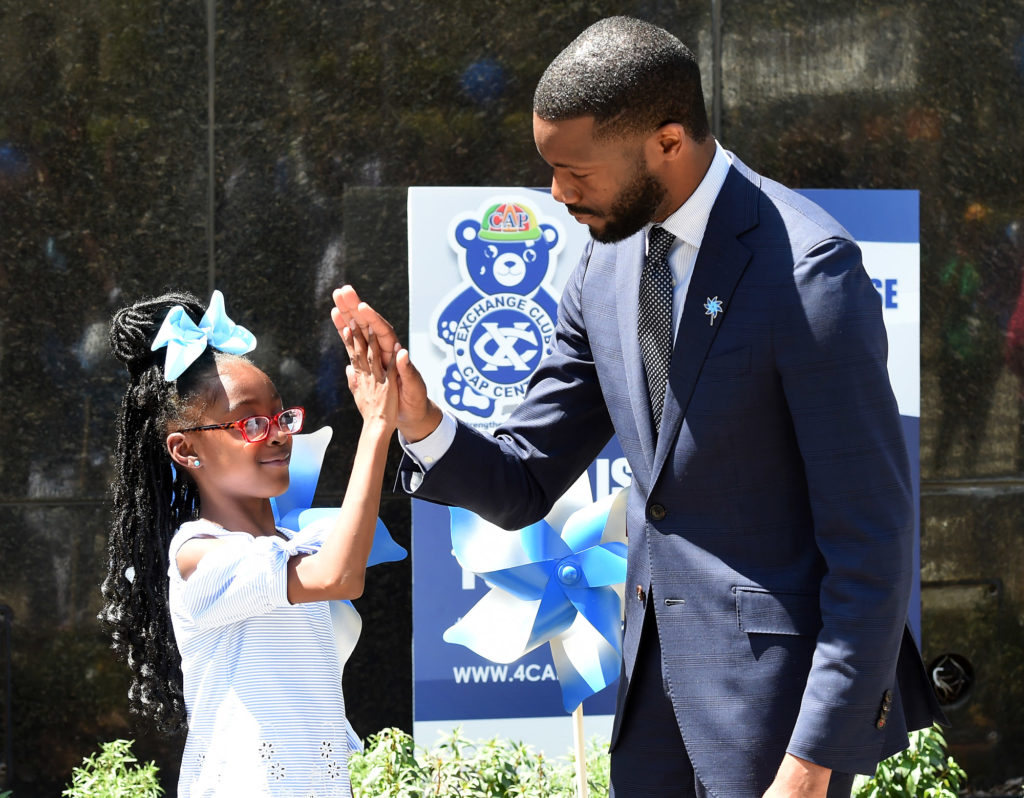
By Ariel Worthy and Solomon Crenshaw Jr.
The Birmingham Times

Mayor Randall Woodfin on Monday took the first step in turning Birmingham blue, planting the first of 13 pinwheels in a Pinwheels for Prevention Garden at City Hall.
The pinwheels commemorated the lives of the 13 children who died in a recent year due to child abuse and neglect.
Woodfin said he and others were planting the pinwheels to bring attention to the vicious cycle of abuse and neglect that is a real problem in all communities.
“One life lost is too many,” the mayor said. “I need everyone to help us break the cycle of child abuse and neglect by talking to the children and adults in your own lives. Preventing child abuse and neglect can also prevent all forms of violence.”
Stacy L. Hopkins, executive director of the Exchange Club Child Abuse Prevention (CAP) Center, cited some statistics.
- One out of every three girls and one out of five boys will be sexually abused before turning 18 years old. Ninety percent of those victims will know their perpetrator.
- Thirty-six percent of children who were abused in their homes are at a higher rate arrested as juveniles.
- A study showed that 14 percent of all men, 36 percent of all women in the prison system reported that they were abused as children.
“In a single year in the state of Alabama, we had over 8,000 children who were involved in child abuse and neglect cases,” Hopkins said. “That same year, 1,670 were lost to abuse and neglect.”
Blue is the color of child abuse and neglect prevention. It was very prominent at City Hall on Monday.
Police cars with blue flashing lights blocked Short 20th Street, which was bordered by blue balloons. Passersby were treated to blue snow cones, blue cupcakes and blue cotton candy, each purchased with special “blue bucks” for the occasion.

City Hall will be illuminated in blue light to recognize April being Child Abuse and Neglect Prevention Month.
“I want to encourage all of our Birmingham residents to stand together with these organizations, with everyone to bring attention to an issue that all too often happens behind closed doors,” Woodfin said. “By standing as one today, we can show that we can build a strong foundation to protect our children and prevent child abuse.”
“We’re all in it together to make a difference in this world to make the children stronger, healthier, happier,” Hopkins said. “We can stop child abuse before it happens, but it does take working together. We want to saturate this community with this message because there is no greater message than our children.”
Happier, Safer Lives
The event was part of a campaign to kick off National Child Abuse Prevention Month, during which groups advocate for children and help raise awareness of the epidemic of child abuse and neglect in America. The goal is to encourage social change and help children have healthier, happier, safer lives.
Planting the pinwheels was part of an initiative by the Exchange Club Child Abuse Prevention Center, which is helping to paint the city blue to raise awareness.
“The campaign is built around making sure we don’t lose any more children,” Hopkins said. “We’re trying to prevent and educate, and paint this city blue. We want to saturate people with this information. We shouldn’t have to lose any more children.”
The Exchange Club will also plant 13 community gardens around the city of Birmingham in honor of each child, she said: “Along with it will be education and tips. We have our Pinwheels for Prevention Motorcycle Benefit Ride, a partnership with Barber Motorsports. We start there on April 14.”
The goal is to make as many people as possible aware of child abuse, Hopkins said.

Safe Kids
The Exchange Club, founded in 1987, is a National Service Organization whose primary focus is child abuse prevention. It has several programs, including Parent Aid, Positive Parenting, and Teen Gap Anger Management, as well as a speakers’ bureau to help with child abuse prevention. The group’s newest program is Safe Kids School Outreach, which aims to prevent child abuse by educating and empowering children in kindergarten through sixth grades. The program is personal for Hopkins.
“Someone I loved dearly suffered the worst kind of abuse from her father for 13 years, from as early as she could remember until she left home at 17,” Hopkins said. “That was a different era, when nobody talked about it.”
Once Hopkins became executive director of the Exchange Club 10 years ago, she came up with the idea for Safe Kids. The goal is to equip children with the skills they need to prevent abuse, neglect, and bullying. Since its September 2016 launch, the program has reached more than a thousand children—but the programs are for more than children.
“We want to strengthen families,” Hopkins said. “I believe that young adults should put their best energies into trying to be their best selves versus overcoming the tragedy of their youth.”
Parenting
Parents have to be taught how to manage their reactions to their children, Hopkins said.
“Little Johnny is not willfully trying to make mom mad by not going potty,” she said. “It’s not where he’s at. If we can teach mom to have a different communication style, that child is more likely to go have a successful day at school. Parents sometimes expect something their child is not capable of doing at that moment in time.”
Many people think there’s one way of parenting, and there’s not, Hopkins said: “It’s developmental. We try to break the cycle of disciplining styles.”
Recently, during a class on bullying, Hopkins said she had a parent talk about overcoming bullying in her own life.
“You can’t give away what you don’t have,” she said. “So, we talked about her bullying experience and life cycles, and breaking those cycles. Whether mom’s going through it, dealing with it, we just help families find another way.”
The Exchange Club Child Abuse Prevention Center is located at 2300 10th Court South and can be contacted at 205-801-5151 or 4CAP.org



